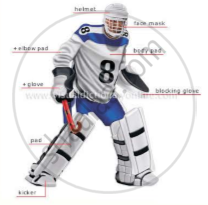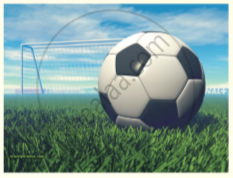Advertisements
Advertisements
प्रश्न
Why did Einstein write a letter to Franklin Roosevelt?
उत्तर
Einstein wrote a letter to Franklin Roosevelt to warn about bomb effect and also wanted to encourage them to make a bomb to utilize its destruction potential.
APPEARS IN
संबंधित प्रश्न
Answer the following question in one or two sentences.
In what ways did Kezia’s grandmother encourage her to get to know her father better?
Answer of these question in a short paragraph (about 30 words).
What incidents during the Everest expedition show Santosh’s concern for her team-mates?
An e-mail, short for electronic mail is a store and forward method of composing, sending, storing, and receiving messages over electronic communication systems. It is the quickest way to communicate in writing.
Form pairs - one student will read the text for 'Hockey', and the second student will read the text for 'Football'.
Hockey

The game starts when the umpire blows his whistle for the opening pass-back. The passback is made at the centre of the field to start the game (also after half- time and after each goal is scored). The ball, which may be pushed or hit, must not be directed over the centre line. All players of the opposing team must stand at least 5 yard from the ball and all players of both teams, other than the player making the pass-back must be in their own half of the field.
There are two umpires to control the game and to administer the rules. These umpires are the sole judges of the game. The umpires are responsible for keeping time for the duration of the game.


In front of each goal is an area known as the penalty area. This is a rectangular area, 40.2m wide and extending 16. Sm into the field where the goalkeeper operates.
A standard adult football match consists of two periods of 45 minutes each, known as halves. Each half runs continuously, meaning that the clock is not stopped when the ball is out of play. There is usually a 15-minute half-time break between halves. The end of the match is known as full-time. Anytime during the match, a team can substitute upto three players maximum.
The game is controlled by a referee who is the official timekeeper for the match, and may make an allowance for time lost through substitutions, injured players requiring attention, or other stoppages. There are also two linesmen who keep guard of the touchlines or sidelines, signalling when the ball crosses the boundary lines. The referee alone signals the end of the match.
Handling the ball deliberately, pushing or tripping an opponent, or hitting a player from behind are examples of fouls, punishable by a direct free kick or penalty kick depending on where the offence occurred. Other fouls are punishable by an indirect free kick.
The referee may punish a player's or substitute's misconduct by a caution (yellow card) or sending-off (red card). A player is given a yellow card is said to have been 'booked'.
• Red - Serious misconduct resulting in ejection from the game. If a player has been sent off, no substitute can be brought in his place.
To us the ashes of our ancestors are sacred and their resting place is hallowed ground. You wander far from the graves of your ancestors and seemingly without regret. Your religion was written upon tablets of stone by the iron finger of your God so that you could not forget. The Red Man could never comprehend or remember it. Our religion is the traditions of our ancestors — the dreams of our old men, given them in solemn hours of the night by the Great Spirit; and the visions of our sachems, and is written in the hearts of our people.
Day and night cannot dwell together. The Red Man has ever fled the approach of the White Man, as the morning mist flees before the morning sun. However, your proposition seems fair and I think that my people will accept it and will retire to the reservation you offer them. Then we will dwell apart in peace, for the words of the Great White Chief seem to be the words of nature speaking to my people out of dense darkness.
Read the extract given below and answer the question that follow.
Why do the dead of the Tribals never forget them or this beautiful world?
When there was a strong wind, the pine trees made sad, eerie sounds that kept most people to the main road. But Mr. Oliver was not a nervous or imaginative man. He carried a torch – and on the night I write of, its pale gleam, the batteries were running down – moved fitfully over the narrow forest path. When its flickering light fell on the figure of a boy, who was sitting alone on a rock, Mr. Oliver stopped.
Boys were not supposed to be out of school after seven P.M. and it was now well past nine. What are you doing out here, boy, asked Mr. Oliver sharply, moving closer so that he could recognize the miscreant.
Read the extract given below and answer the question that follow.
Why did the people keep to the main road instead of taking the shortcut?
What comment did Potter make wizen Braithwait? hurt himself? What did he mean by that comment How did Pamela react to Potter's remark?
(i) What makes Mridu conclude that the beggar has no money to buy chappals?
(ii) What does she suggest to show her concern?
During which time of the day would the hermit would leave the forest and go out?
Who used to give away everything he had, which even included his gold earrings?
How was the wicked farmer punished for his greed?
What did the narrator do with the hatchet?
Describe Mr. Purcell’s daily routine at the shop.
How did Vijay Singh use the egg? How did he use the lump of salt?
“Trees are to make no shade in winter.” What does this mean? (Contrast this line with the line immediately before it.)
What was the Dog’s experience with the Lion?
What does the word ‘gong in the passage mean?____________.
- Notice the way Mr Gessler speaks English. His English is influenced by his mother tongue. He speaks English with an accent.
- When Mr Gessler speaks, p, t, k, sound like b,d,g. Can you say these words as Mr Gessler would say them?
It comes and never stops. Does it bother me? Not at all. Ask my brother, please.
Which of the following words would best describe Abou Ben Adhem?
Which of the following lines contains the same literary device as the one in 'I wandered lonely as a cloud,' from wordsworth's poem, 'Daffodils'?
